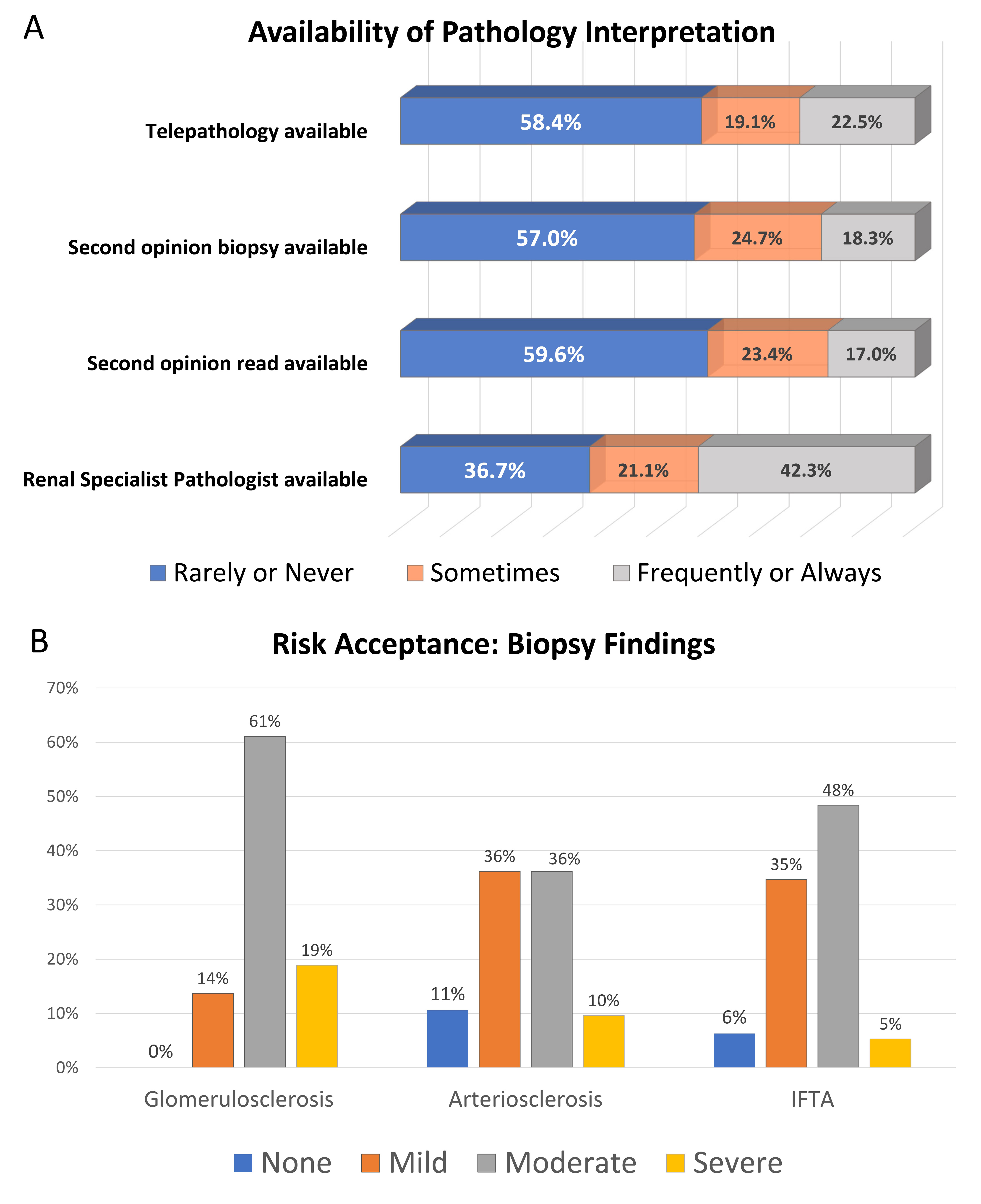Deceased Donor Procurement Biopsy Practices, Interpretation, and Histology-Based Decision Making: A Survey of US Transplant Centers
1Saint Louis U., St. Louis, MO, 2U. of Iowa, Iowa City, IA, 3WUSTL, St. Louis, MO, 4Mid-Am. Trans., St. Louis, MO, 5Columbia U., New York, NY, 6Hennepin Healthcare, Minneapolis, MN, 7MedStar Transpl. Inst., Washington, DC
Meeting: 2022 American Transplant Congress
Abstract number: 752
Keywords: Biopsy, Donors, marginal, Graft acceptance, Histology
Topic: Clinical Science » Kidney » 32 - Kidney Deceased Donor Selection
Session Information
Session Name: Kidney Deceased Donor Selection
Session Type: Poster Abstract
Date: Saturday, June 4, 2022
Session Time: 5:30pm-7:00pm
 Presentation Time: 5:30pm-7:00pm
Presentation Time: 5:30pm-7:00pm
Location: Hynes Halls C & D
*Purpose: In light of contemporary controversies on the utility of kidney procurement biopsies in predicting allograft outcomes and guiding organ acceptance, we surveyed transplant providers regarding biopsy practices, interpretation and applications to decision making.
*Methods: We designed and conducted a survey of US kidney transplant programs by email and professional society LISTSERV postings (4/2021-6/2021). The instrument assessed constructs including biopsy frequency, modality, availability of specialized pathology, interpretation, and impact on practices.
*Results: Of responses from 112 transplant centers, 95 providers endorsed involvement in organ acceptance (72.6% transpl. surgeon, 20.0% transpl. nephrologist, 6.3% transpl. coordinator, 1.1% APP). Over a third of centers (35.7%) obtained procurement biopsies on most to all kidneys. Most providers decided to biopsy jointly with the OPO (82.9%) and used formal criteria (72.3%), although almost half reported requesting biopsies outside of criteria (41.5%.) Wedge biopsies were preferentially obtained (56.3%.) Most respondents used a semiquantitative scoring system for interpretation (56.8%); the majority preferred the Remuzzi score. Several respondents reported rarely/never having access to renal specialist pathologists (36.7%) or telepathology (58.4%, Fig. A) Age, diabetes, and AKI were commonly cited reasons to obtain biopsy. Severe glomerulosclerosis was acceptable to 18.9% of respondents, but less than 10% would accept severe arteriosclerosis or interstitial fibrosis/tubular atrophy (IFTA, Fig. A) Most respondents reported a favorable biopsy would encourage them to accept a marginal kidney (71.6%); almost half indicated an unfavorable biopsy would lead to decline in a standard criteria kidney (46.3%.)
*Conclusions: The procurement biopsy remains common despite poor exposure to experienced renal pathologists, either at center or remotely. Respondents appear to use “good” biopsies as a tool to accept marginal kidneys, but almost half find a “bad” biopsy a reason to decline an otherwise clinically acceptable kidney. Further prospective study of the impact of biopsy findings on organ acceptance and patient-centered outcomes is needed.
To cite this abstract in AMA style:
Fleetwood V, Axelrod D, Caliskan Y, Randall H, Wellen J, Lichtenberger M, Dedert C, Rothweiler R, Marklin GF, Brockmeier D, Schnitzler MA, Husain SA, Mohan S, Kasiske B, Cooper M, Lentine KL. Deceased Donor Procurement Biopsy Practices, Interpretation, and Histology-Based Decision Making: A Survey of US Transplant Centers [abstract]. Am J Transplant. 2022; 22 (suppl 3). https://atcmeetingabstracts.com/abstract/deceased-donor-procurement-biopsy-practices-interpretation-and-histology-based-decision-making-a-survey-of-us-transplant-centers/. Accessed February 28, 2026.« Back to 2022 American Transplant Congress

